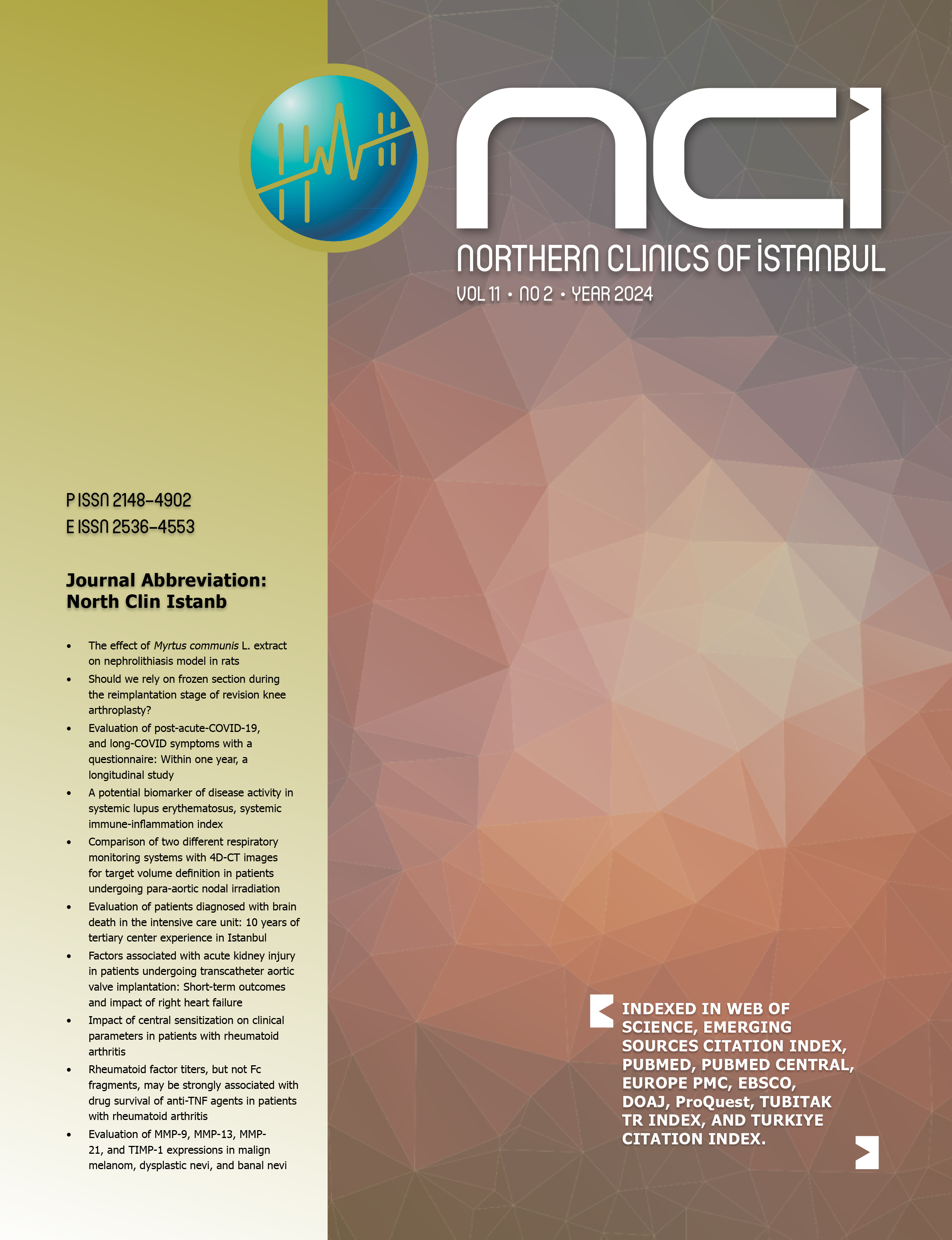Real-life experience of tofacitinib in patients with treatment-resistant rheumatoid arthritis: A 5-year follow-up: Monocentric experience
Ozlem PehlivanDepartment of Rheumatology, University of Health Sciences, Umraniye Training and Research Hospital, Istanbul, TurkiyeOBJECTIVE: The present study aims to assess the short- and long-term effects of tofacitinib (TOFA) therapy on efficacy, safety, and drug retention rate patients with rheumatoid arthritis (RA) refractory to conventional synthetic disease-modifying anti-rheumatic drugs (csDMARDs) and/or biological disease-modifying anti-rheumatic drugs (bDMARDs).
METHODS: Thirty-five patients with RA who received TOFA therapy for at least 3 months in rheumatology outpatient clinic between December 2015 and December 2020 were included in the study. The prospectively follow-up results of the patients obtained on the 6th month and 5th year are presented. Demographic characteristics of the patients, the disease activity score-28 for RA with erythrocyte sedimentation rate (DAS 28-4 [ESR]), change in DAS-28, health assessment questionnaire score, patient visual analog scale score, and laboratory parameters were recorded. The data at 6 months and 5 years of treatment were compared with baseline data. All side effects were recorded at each follow-up visit. Wilcoxon signed-rank tests were used for analysis.
RESULTS: Of the 35 patients, 23 received TOFA treatment after receiving ≥1 bDMARDs, while the remaining 12 patients received TOFA therapy were biologic naive. On the 6-month follow-up, DAS 28-4 (ESR) score and DAS28 improvement significantly decreased at the 6th months from baseline (p<0.001 and p<0.001, respectively), and moderate disease activity was achieved in 13 patients. High disease activity persisted in four patients. DAS28 improvement according to the EULAR response criteria was good response in 86% of the patients. DAS 28-4 (ESR) score and DAS28 improvement significantly decreased at 5 years from baseline (p<0.01 and p<0.001, respectively), and the moderate disease activity was achieved in 10 patients. High disease activity persisted in two patients. Drug retention rate at 5-year follow-up was 54% and the daily glucocorticoid therapy could be discontinued in 9 patients (47%). Three patients (15%) were tested positive for COVID-19. None of them required hospitalization and no deaths were occurred due to COVID-19.
CONCLUSION: TOFA is effective and well-tolerated treatment options that reduce the need for steroids in patients with RA.
Keywords: Disease activity, real-life data; rheumatoid arthritis; tofacitinib.
Tedaviye dirençli romatoid artritli hastalarda tofasitinibin gerçek yaşam deneyimi: 5 yıllık takip: Tek merkez deneyimi
Ozlem PehlivanSağlık Bilimleri Üniversitesi Ümraniye Eğitim ve Araştırma Hastanesi Romatoloji Anabilim Dalı, İstanbulAmaç: Bu çalışma konvansiyonel sentetik hastalık modifiye edici anti-romatizmal ilaçlara (ksDMARD) ve/veya biyolojik hastalık modifiye edici anti-romatizmal ilaçlara (bDMARD) dirençli romatoid artrit (RA) hastalarında tofasitinib (TOFA) tedavisinin kısa ve uzun dönem etkinlik, güvenlik değerlendirilmesi ve ilaçta kalma oranlarını değerlendirmeyi amaçlamaktadır.
Yöntem: Çalışmaya Aralık 2015-Aralık 2020 tarihleri arasında romatoloji polikliniğinde takip edilen en az üç ay TOFA tedavisi almış RA tanılı otuz beş hasta dahil edildi. Hastaların 6.aydaki ve 5.yıldaki prospektif takip sonuçları sunuldu. Hastaların demografik özellikleri, hastalık aktivite skoru (DAS 28-4 (eritrosit sedimantasyon hızı (ESH)), DAS-28'deki düzelme, sağlık değerlendirme anketi skoru, hasta vizüel ağrı skalası ve laboratuvar parametreleri kaydedildi. Altı aylık ve beş yıllık takip verileri, bazal verilerle karşılaştırıldı. Yan etkiler takip ziyaretlerinde kaydedildi. Veri analizinde Wilcoxon testi kullanıldı.
Bulgular: Otuz-beş hastanın 23'ü ≥1 bDMARD aldıktan sonra TOFA tedavisi alırken, kalan 12 hasta daha önce bDMARD almamıştı. Altı aylık takipte DAS28-4 (ESR) skoru ve DAS28 düzelmesi önemli ölçüde azaldı (p<0.001, p<0.001) ve 13 hastada orta düzeyde hastalık aktivitesi elde edildi. 4 hastada yüksek hastalık aktivitesi devam etti. EULAR yanıt kriterlerine göre DAS28 düzelmesi değerlendirildiğinde hastaların 86%'sında iyi yanıt tespit edildi. DAS 28-4 (ESH) skoru ve DAS28 düzelmesi, başlangıca göre beşinci yılda önemli ölçüde azaldı (p<0.01, p<0.001) ve 10 hastada orta düzeyde hastalık aktivitesi saptandı. Yüksek hastalık aktivitesi 2 hastada devam etti. Beş yıllık takipte ilaçta kalım oranı 54% idi ve dokuz hastada (47%) günlük glukokortikoid tedavisi kesilebildi. Üç hastada (%15) COVID-19 testi pozitif çıktı. Hastaneye yatış gerektirmedi ve COVID-19 nedeniyle ölüm olmadı.
Sonuç: TOFA, RA hastalarda streoid ihtiyacını azaltan, etkili ve iyi tolere edilen bir tedavi seçeneğidir. (NCI-2022-1-10/R1)
Anahtar Kelimeler: Romatoid artrit, tofasitinib, hastalık aktivitesi, gerçek yaşam verisi
Manuscript Language: English





















